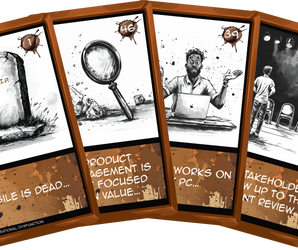Paul Goddard will speaking at our Agile Games Workshop via live video link on 26th March. I had some questions for him to understand his reasons for creating The Retrospective Lexicon. Here is what he told us:
[Simon Gibbs] You are soon going to be presenting The Retrospective Lexicon. How would you describe this product?
[Paul Goddard] The Lexicon is aimed to help bring some new vocabulary and stimulus to an agile team’s retrospective discussions. The cards are split between three different types of word; ADJECTIVES to help describe events, EMOTIONS to help attendees attach feeling to those events, and ACTIONS to encourage more specific change to occur after the retrospective. There are many ways the cards can be used. Scrum Masters or facilitators can design the entire retrospective around these cards, or just use one card to start a discussion when conversations dry up.
[Simon Gibbs] How did this come about? What problems did you observe that motivated you to create this product?
[Paul Goddard] From observing a lot of retrospectives myself, much of the language and specifically emotions can be more surface-level or binary. Good or bad, happy or sad for instance. I wanted to give teams the chance to connect more with more descriptive language and more wide-ranging emotions. Maybe then the retrospectives can become deeper and more effective at changing behaviors.
[Simon Gibbs] As a developer, I have been in many retrospectives and agreed on many action points. Often those actions are neglected and are not completed and people seem to accept that. Have you seen the same pattern?
[Paul Goddard] Absolutely. Too many actions points leads to a lack of focus, and not achieving those actions undermines the power of the retrospective process itself. I also see action points that are far too broad and not specific enough. “We need to communicate better” is a personal irritation of mine!
[Simon Gibbs] How can teams agree actions that are deeply valuable?
[Paul Goddard] Teams will only start to believe in retrospectives when impediments or actions get resolved. Talking about issues can be cathartic, but many teams will lose faith in continuous improvement if things fail to improve. The best way for a Scrum Master or facilitator to gain the respect of a team is to help solve there greatest impediment and the retrospective is built into the Scrum framework to help deliver on this.
[Simon Gibbs] People seem to invest a great deal of attention to the job of making retrospectives better. There is a lot of innovation and coaches seem to seek out novelty and change. Is this leading to better retrospectives? Are we as an industry making progress on this?
[Paul Goddard] I think there are some great resources out there to help. Retro games are popular and can help stimulate learning too by thinking about the process differently through metaphors etc. In this respect we are making progress, but too many Scrum Masters still tell me that they spend a relatively short amount of time on the retrospective part of the process. It takes time to establish safety and expose emotions within a team and a slower, deeper retrospective is a great tool to start that process.







